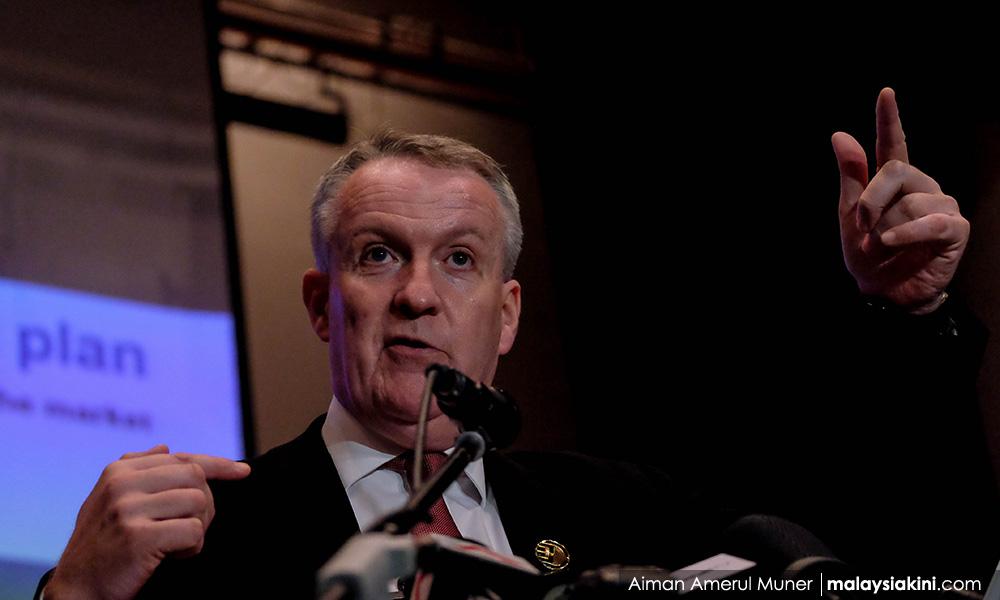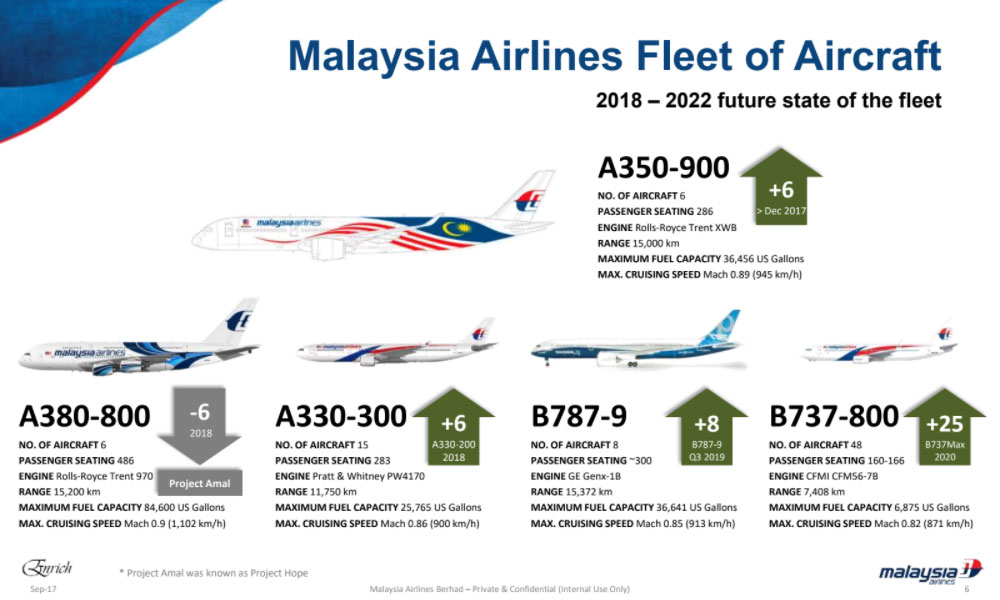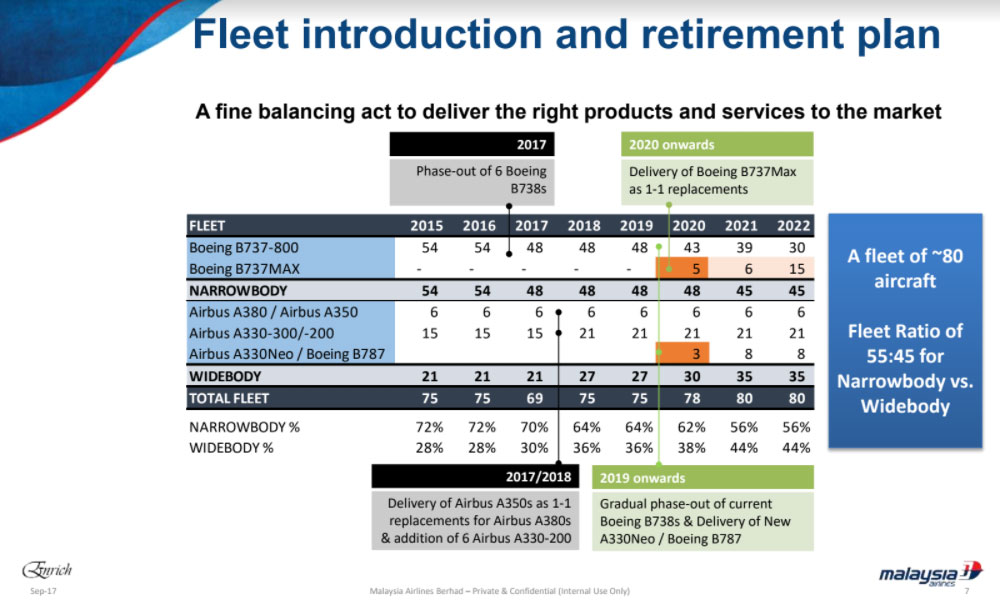
Malaysia Airlines (MAS) CEO Peter Bellew has denied former premier Dr Mahathir Mohamad’s allegations that the airline was trying to please Prime Minister Najib Abdul Razak at the expense of business considerations.
Bellew said MAS had been looking to replace various aircraft in its fleet for some time, as their leases near its end.
“I have read everything on the blog; some of it has been reported to me. A lot of it is quite inaccurate, and nobody contacted me or our company to check any of the stuff that was on there.
“I believe the essence of it was that somebody said we are not buying the aircraft and other kinds of stuff. We do plan to conclude the deal to buy the aircraft directly off Boeing…
“We have been talking to Airbus about the A330neo and the (Boeing) 787s. That’s always been the intention. Today we have just done something else. We’ve got an opportunistic way to lease for a very good price a good aircraft.
“While I have great respect for what this gentleman (Mahathir) has done in the past, he didn’t check anything he wrote on the blog, and of course, at any time we would like to be transparent with anybody in Malaysia,” he told reporters at a briefing at the MAS Acadamy in Kelana Jaya today.
He was asked to respond to allegations posted on Mahathir’s blog on Monday.
Mahathir had questioned whether MAS is planning to follow through with its deals to acquire six Airbus 350-900 aircraft following reports that the airline is also acquiring 25 of Boeing’s 737 MAX 10 aircraft, and eight Boeing 787-900 Dreamliners.
He also questioned whether MAS is planning to expand to new routes, and said it reflects poorly on the management if it decides to suddenly increase its routes.
'Normal business deal'
Meanwhile, commenting on the media spotlight the company had received in recent weeks, MAS chairperson Md Nor Md Yusof said it was only a normal business deal that had been played up.
“For us, it was a business as usual kind of thing, but somehow it was taken up as something more than what it was.
“I would stand here and say it was nothing more than a normal business deal,” he said, adding that the interest in the deal is understandable, given that MAS is Malaysia’s flag carrier.
During Bellew’s briefing, he said the acquisition of new aircraft would result in leases between five to 20 percent cheaper than the older aircraft it replaces, while being more comfortable. This would lead to a fall in the overall cost of offering each seat.
He explained that aircraft manufacturers such as Boeing, generally offer better deals to airline customers, compared to when it sells aircraft to aircraft leasing companies.
This comes in the form of ancillary services for airlines in the form of credits for training and maintenance, discounts on using aircraft simulators, and free software. These can worth up to 30 percent of the value of an aircraft, he said.
He added that since the deal with Boeing was announced, various companies have contacted MAS offering to finance the deal through a ‘sale and leaseback’ deal, and there is already one preliminary offer on the table.
This is because the Dreamliner is heavily in demand in the leasing market.
Depending on market conditions, Bellew said the airline would be choosing between an operating lease or a finance lease, although an operating lease is more likely.
An operating lease would see MAS pay a monthly rent for the aircraft for 10 to 12 years before returning it to the leasing company. A finance lease, meanwhile, would see the airline paying off the cost of the aircraft over a similar period, and would eventually own the aircraft.
Overall, Bellew said MAS’ fleet would only expand modestly from 75 aircraft last year to 80 aircraft in 2021 and 2022. It would have only 69 aircraft this year.
However, it would increase the proportion of widebody aircraft in its fleet from 30 percent this year to 44 percent from 2021 onwards in a bid “rebalance” the fleet, he noted.
“That is what a normal national carrier with a premium business service does. If you are trying to get people to travel in business class and you want to fly longer distances, you need the widebody aircraft.
“We had gone too much the other way (in the past). The fleet we have at the moment is very similar to what you would see in more of the low-cost carrier environment” he said.
The Boeing 737 MAX 10 would serve as a one-to-one replacement for its retiring fleet of Boeing 737-800 aircraft, while a recent deal to buy the Airbus 350-900 would serve as a one-to-one replacement for the retiring Airbus 380-800 aircraft.
He said the Airbus 380-800 will be used by a new airline being planned under the codename “Project Amal” (formerly Project Hope), which would specialise in flying hajj pilgrims. The plan is still being studied by Khazanah Nasional.
If the plan falls through, the aircraft would simply be sold.
As for the six Airbus 350-900, Bellew said these are former Air Berlin aircraft that were being returned to its leasing company Aercap as Air Berlin is being liquidated.
These aircraft are well furnished, had recently undergone heavy maintenance, and MAS had managed to get a good deal on them after a long search for a replacement to the Airbus 380-800.
He said these are cheaper to maintain and lease, as well as being more comfortable compared to MAS’ existing widebody aircraft. Its lie-flat seats would allow the airline to charge more, he added.
Bellew also explained that MAS had been in talks with aircraft manufacturers to buy either the Airbus 330neo or Boeing’s Dreamliner for over a year, before deciding to buy the Dreamliner.
He said the aircraft has a low maintenance cost and high fuel efficiency while being comfortable. Training pilots to fly it can be done in a few weeks as it is similar to MAS’s existing Boeing 737 fleet.
While MAS only plans to use it for medium-haul flights at the moment, it has the necessary range to for long-haul flights to Europe and the US. Bellew said the Dreamliner would incur similar costs in both types of flights.
This allows the airline to be flexible in its future offerings, although it is not planning to add long-haul flights at this time.
“I think, personally, there is going to be a significant shift in the aviation industry over the next three, four years. I think will become less common to transit through the Gulf States, and I think there will be fewer options to do that,” he said.
No new funding required
Asked about financing, Bellow said there are still funds available from the RM6 billion that Khazanah had set aside for the airline’s restructuring, and these are being “drip fed” to the company as it reaches its targets.
However, the funds for the new aircraft purchases would come from its daily expenses.
“No new funding required, just day-to-day expenditures. We are retiring the aircraft and we are taking on new and different aircraft. We are changing the type of the aircraft.
“The cost should only come down rather than going up, that’s our approach and there is no additional funding required to do this,” he said.
He added that MAS is on track to become consistently profitable in the second quarter of next year, and would be ready to be relisted on the stock market this year.
He said the company would have been profitable this year if the US Dollar had not depreciated since Donald Trump won the US presidential election in November last year.

image: https://i.malaysiakini.com/1159/a67f7965100e3a7777972815d584de4a.jpeg

- Mkini


No comments:
Post a Comment
Note: Only a member of this blog may post a comment.